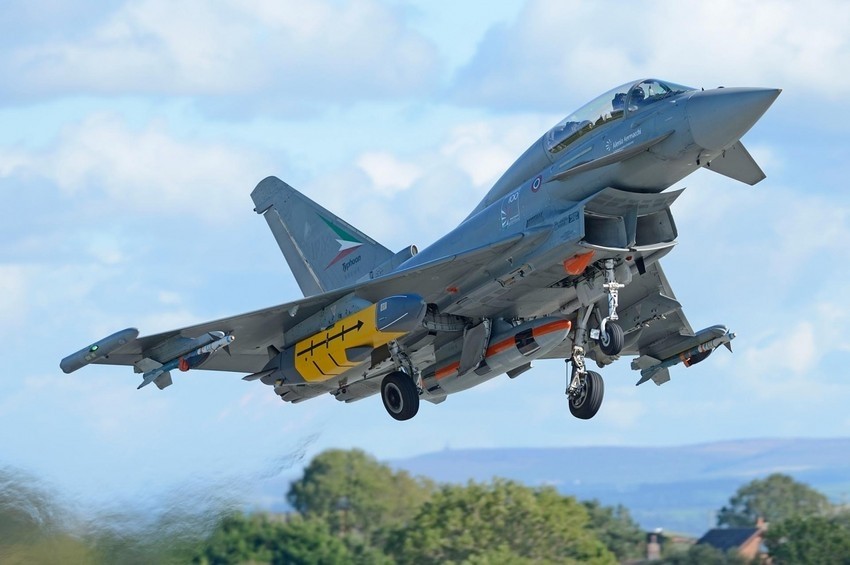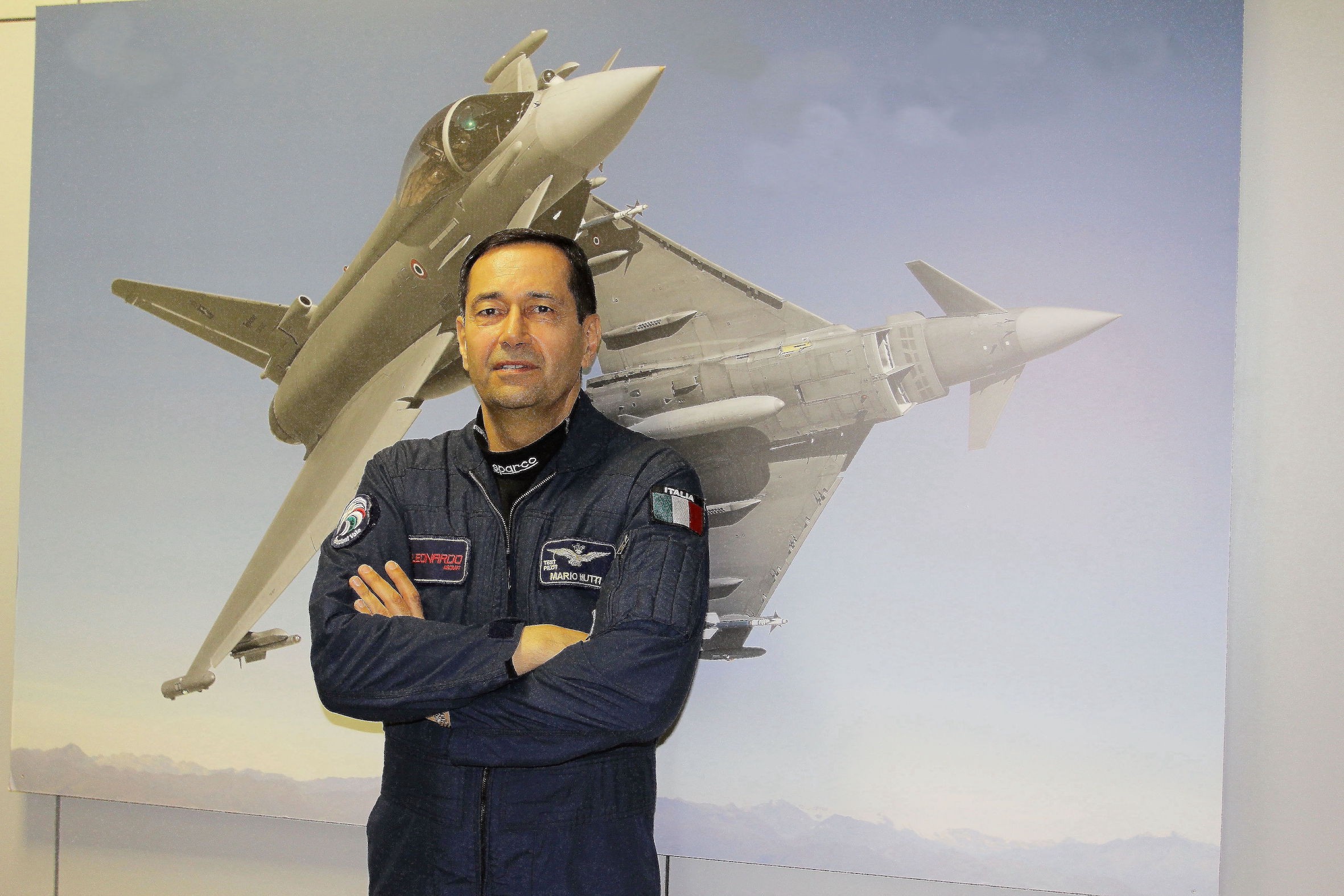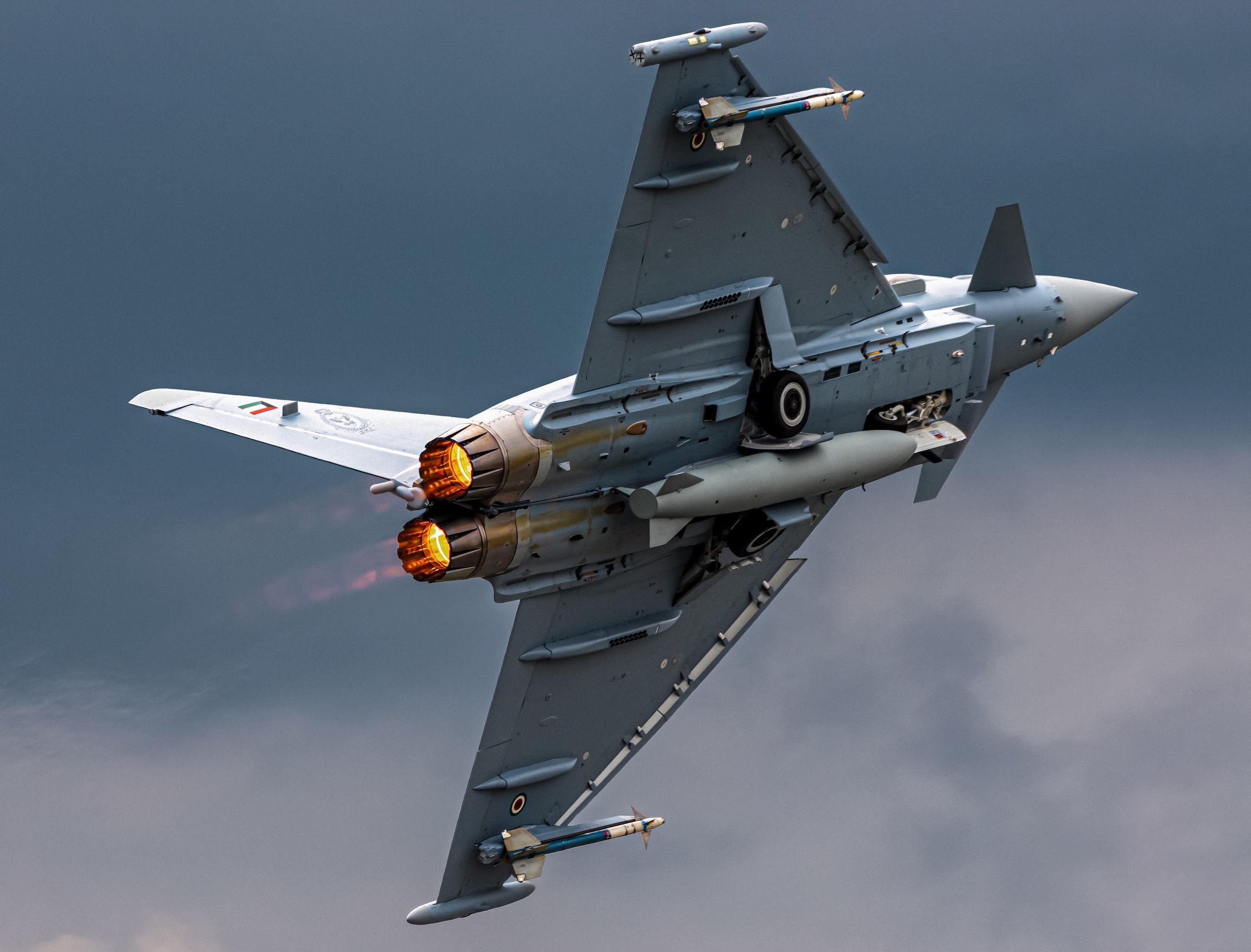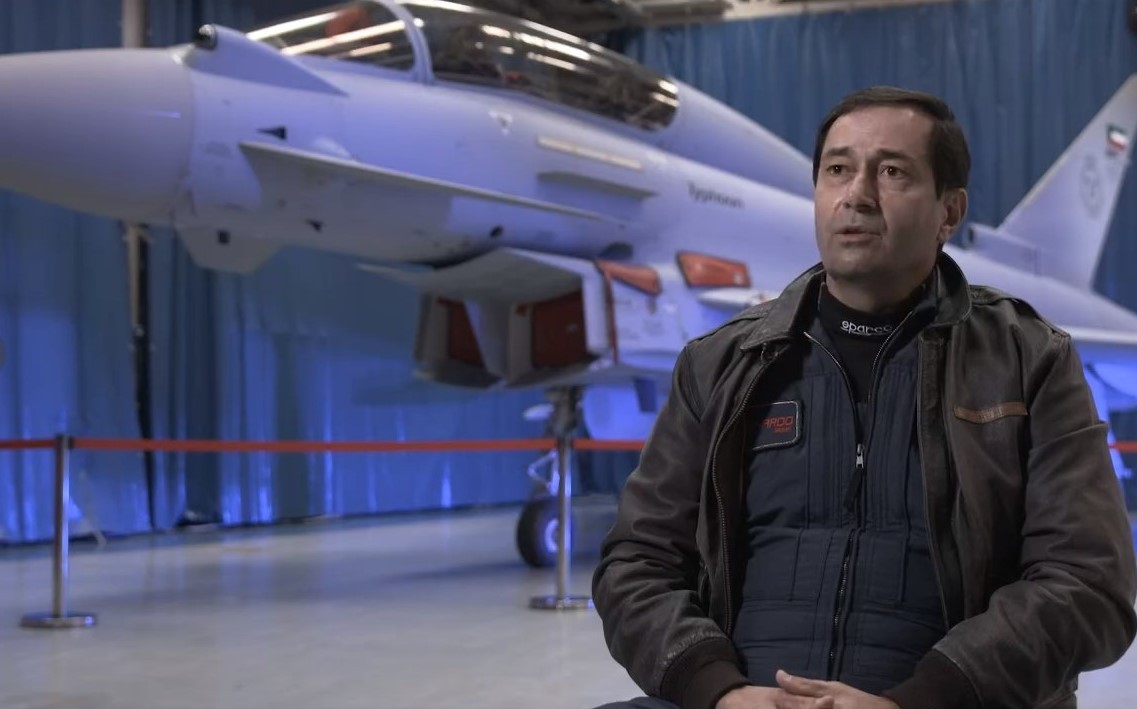Commander Mutti, who is the Leonardo Aircraft Division Chief Test Pilot, has spent 20 years working alongside the programme’s other test pilots to help develop the capability of the Eurofighter Typhoon. In this Eurofighter Expert feature, he talks about his career, the challenges and his love for the Eurofighter Typhoon.

Tell us about your early career?
After joining the Italian Air Force Academy in 1985, I went to the NATO jet pilot training programme in Texas, and that’s where I achieved my wings. I went on to gain operational experience on Tornado.
Later, when I was offered the opportunity to train to become a test pilot I jumped at the chance. I went to the Empire Test Pilot School at Boscombe Down (UK) and I graduated in 1995. Even today — some 27 years later — I can still remember every single flight and all my tutors. These were amazingly experienced test pilots, and they gave me rock solid foundations for what is a breath-taking job.
From there I was assigned to the Italian OTC ‘Reparto Sperimentale Volo’ where I had the opportunity to work as project pilot on a number of different aircraft. This meant I was able to experience a great many of the western world’s fighter jets. I joined Leonardo (which at the time was named Alenia) in 2004 and I continued my duties as test pilot, mainly in the fighter business.
I have spent 20 years helping to develop the Eurofighter, including our latest challenge — the integration of the E-Scan radar. It’s all been focused on turning Eurofighter into the most capable multirole aircraft available on the market.
Who were key people who inspired / mentored you?
I wouldn’t single out any one individual but throughout the different phases of my career, I’ve always tried to take inspiration from the people around me, whether that’s in the Air Force, at Boscombe Down or here in Leonardo. I believe that getting guidance from leading professionals is absolutely essential for your growth.
In time, you may even become an example for others — provided, of course, you have been able to make coherent choices, and maintain your determination even when things become difficult, or the competition is tough.

What attracted you to your current role?
Being a test pilot is so much more than a role or a full-time job. It’s a way of life. Sitting in the jet or interacting with the flight test community becomes part of your daily thoughts, part of your life. It is something that grows with you, with every passing flight hour or fresh experience.
When I was given the opportunity to join the test flight team at Leonardo, it felt like a natural continuation of the journey I’d started several years before. I was able to continue to follow my passion, albeit in a different organisation.
When you become proficient at something you are more and more aware of everything around you. You get increased satisfaction out of what you are doing.
I still fly full time – it is a key part of the job. I now have more than 2,000 flying hours over 20 years on flight test on Eurofighter. I fly between 90 and 120 flight test hours per year. Being inside the cockpit of Eurofighter is a real privilege.
Do you remember your first flight?
Very clearly. It was back in 2001 and it was a transition flight in a twin seater. This was in the early days of the development of the aircraft. The mission was focused on performance landings, supersonic acceleration and flying with an engine out. Typhoon’s engine out performance was incredibly impressive. Even in that early stage I could sense the huge potential in the aircraft.

What skills do you need to be a test pilot?
Naturally, good flying skills, observation and reporting are essential in test flying. Team building and teamwork is also essential, because a ‘single man aircraft’ does not and must never exist. Relationships with engineers and customers are very important and they grow over time.
But the thing that makes all the difference is experience. A test pilot has to be aware of what is on the market and what is to come, as well as operational needs. That is something that takes time and exposure to absorb. There are no shortcuts.
What are the main challenges you face in the role?
Day-to-day pressure is generated by milestones and deliveries. Flight test takes place at the end of a long chain behind engineering and manufacturing and it’s normal to be under time pressures. But the real challenge is coping with the complexity and the time pressure during flight operations for long periods of time, while at the same time remaining safe and maintaining a balanced judgement.
To meet quality, safety under time pressure takes experience. You have to know the system and yourself, this allows you to perform effectively, while maintaining acceptable levels of safety.
It helps that the flight test community is quite a tight-knit group, and we are in constant communication. We regularly share experiences and knowledge with our colleagues at other partner companies.
How does it feel to be working as part of the Eurofighter programme?
It’s been an amazing experience. When I joined it was love at first sight and after two decades it still seems a dream to me. The Eurofighter consortium is probably the best place is the world to be a test pilot because you get to work with top professionals in every discipline. The more involved I’ve become, the more I have discovered the capability and potential of a superb organisation.
As a pilot you are right at the cutting edge, but you are not on your own. You are part of a community, a family almost. I have the opportunity to partner with highly competent professionals from the four nations; to share flights, experiences and opinions with very capable colleagues in the other partner companies, as well as with some of the best military fighter pilots around. These experiences and people feed my continuous technical and personal growth.
It's a fantastic experience.

What is your current focus of attention?
In my early days here, we were dealing with Eurofighter’s flying qualities and engine integration. Then the focus moved to the sensors: the M-Scan radar, IRST (Infra Red Search and Tracker), HEA (Head Equipment Assembly) and LDP (Laser Designator Pod) just to name some. We also carried out lots of weapons integration activity — initially, Air-to-Air but then an impressive array of Air-to-Surface ammunitions too.
Our latest challenge is the E-Scan radar. It is an ambitious programme because we are delivering a lot of capability, especially when you compare us with our competitors. It has a wide field of regard and is capable of outperforming everything else available on market.
I believe it has the potential to change the rules of Air-to-Air missions. In combination with the beyond visual range missiles it is a real game changer. With it you can maintain supersonic while supporting your missile. The combination of Eurofighter and the E-Scan radar means you can see threats earlier, accelerate faster, and fire missiles at a longer range than any of our opponents.
Even as we are testing the radar, the consortium is capturing the requirements and developing concepts and technologies for the LTE (Long Term Evolution) of Eurofighter, which will transform the weapons system over the next decade, so that it’s ready to face new threats and emerging scenarios.
Any advice on anyone about getting to the top of your profession?
Throughout my career I have never focused on a final goal but have taken things day by day. I’ve always tried to get the best out of every situation from pilot training, through operational flying and so on.
For me, the top is not a job title or position. The top is when you are satisfied with what you have achieved, and you feel that your potential has been reached. When you’re working as part of a team, when things go well, one of the best sensations is to see your own satisfaction mirrored and multiplied by your teammates.
It’s essential to stay healthy and focused. You also have to be determined and capable, but also lucky to meet people through your career who understand you. Then you need to invest in yourself, in your professional growth and able to evaluate opportunities in a medium to long-term perspective. Finally, you need courage to make choices.
Nowadays, I am aware that being at the top is a temporary state. It may be true today, but it won’t be next week unless you put a lot of effort into keeping updated. That includes keeping in touch with customers and understanding their needs as they evolve. Then you can feed back into the system and restart the process of designing, developing, and testing.
Do you have a typical day?
No, no one day is the same. We test different things in lots of various scenarios. For example, we deploy from the Hebrides for missile firing tests, to the Middle East for hot weather trials. Even at home base, test flights can be early morning or late at night if you’re testing something like night vision goggles.
Flying is a priority for the company because the Eurofighter programme relies on progress from flight tests. So, my days are organised around flights. Reporting is a typical duty too —each flight demands a significant amount of reporting time. As a result, you have to be able to organise your working day, your rest periods and your private life around the flying programme. As a test pilot you also spend several months each year away from your home base, either for flight test or commercial campaigns.
Meetings also require a significant amount of time and some travel. Then there a number of other activities like maintaining your knowledge and flying currency are also time consuming. I also have the Flight Operations organisation to run.
Obviously, there isn’t much free time so you have to be careful to manage stress and fatigue. I find early morning jogging and taking early nights very beneficial.
How do you work with other companies in the Eurofighter programme?
It’s a collaboration for the greater good. All four Eurofighter Partner Companies are responsible for flight test operations and flight test campaigns are distributed according to their respective test assets, development aircraft configurations, workload and their traditional strengths. The project pilots from each company meet up on a regular basis and we share knowledge, we share simulators we even share test flying. We always make sure that at least two flight test organisations share a campaign, to enhance confidence in the clearance process and product quality. Planning takes place at Eurofighter consortium level where plans are optimised and streamlined. There are a great many interdependencies.
How do you ensure work-life balance?
What works for me is having a strong discipline. When we started on Eurofighter it was the first time we’d had a 9G aircraft in Europe. I went through all the available literature to find out how other pilots coped. It was clear that it was essential to be fit, hydrated and well rested. If you’re able to get a good night’s rest that’s 50% of the job. With experience you learn to recognise when stress is building to unacceptable levels and to slightly ‘throttle back’. What works for me is having a simple balanced diet and getting out into nature when I can.
